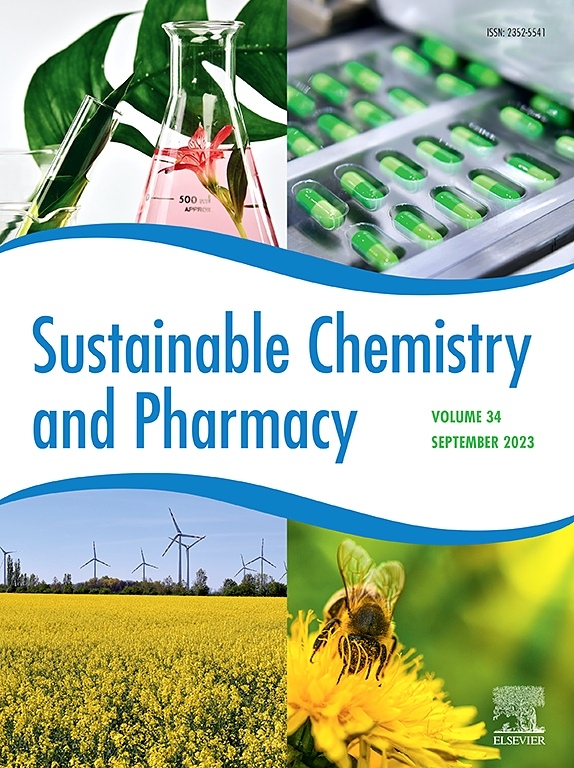Microbeads from recycled polystyrene yogurt cups for the in-syringe micro solid-phase extraction of four opioids from environmental and biological samples
IF 5.5
2区 化学
Q2 CHEMISTRY, MULTIDISCIPLINARY
引用次数: 0
Abstract
A novel procedure for the extraction and determination of four opioids from environmental and biological fluids is presented. The main goal of this study is to introduce an innovative method for recycling plastic waste (i.e., polystyrene), aiming to achieve a consistent and dependable microstructure. Polystyrene microbeads, deposited on a rounded piece of paper, have been used as a sorbent material in an in-syringe extraction device. For the preparation of the polymeric sorbent, an emulsion solidification technique was optimized, achieving a regular micro material, obtained from second-hand regenerated polystyrene polymer from yogurt cups. This work presents, for the first time, the use of recycled polystyrene as micro-sorbent integrated into a paper-based support, combining waste valorization with effective analyte extraction. Under the optimum conditions, methadone, tramadol, codeine, and morphine were determined by direct injection mass spectrometry in environmental water as well as biofluids as saliva and urine. Limits of detection lower than 8 μg L−1 and precision better than 14.9 % have been obtained for all the analytes in saliva and environmental water samples. The interference of the endogenous compounds of urine prevents the determination of morphine and codeine in this matrix. The trueness, expressed as relative recovery (RR), ranged from 85 % to 114 %. The extraction device has proved to be a valid and sustainable alternative to traditional sorbents, offering good analytical standards and being transversal for the application to different matrices. The simplicity and environmental friendliness of this approach make it highly adaptable across various research and industrial domains.

从回收聚苯乙烯酸奶杯中提取微珠,用于注射器内微固相萃取环境和生物样品中的四种阿片类药物
提出了一种从环境和生物流体中提取和测定四种阿片类药物的新方法。本研究的主要目标是介绍一种回收塑料废物(即聚苯乙烯)的创新方法,旨在实现一致和可靠的微观结构。聚苯乙烯微珠沉积在一张圆形的纸上,被用作注射器内提取装置的吸附剂材料。对于聚合物吸附剂的制备,优化了乳液固化技术,得到了一种规则的微材料,该材料是由酸奶杯中的二手再生聚苯乙烯聚合物制备的。这项工作首次提出将回收聚苯乙烯作为微吸附剂集成到纸基支架中,将废物增值与有效的分析物提取相结合。在最佳条件下,用直接注射质谱法测定了环境水以及唾液和尿液等生物体液中的美沙酮、曲马多、可待因和吗啡。在唾液和环境水样中的检出限均小于8 μ L−1,精密度均优于14.9%。尿液内源性化合物的干扰阻止了吗啡和可待因在该基质中的测定。准确度,以相对回收率(RR)表示,范围为85%至114%。该萃取装置已被证明是传统吸附剂的有效和可持续的替代品,提供了良好的分析标准,并且适用于不同的基质。这种方法的简单性和环保性使其在各种研究和工业领域具有很高的适应性。
本文章由计算机程序翻译,如有差异,请以英文原文为准。
求助全文
约1分钟内获得全文
求助全文
来源期刊

Sustainable Chemistry and Pharmacy
Environmental Science-Pollution
CiteScore
8.20
自引率
6.70%
发文量
274
审稿时长
37 days
期刊介绍:
Sustainable Chemistry and Pharmacy publishes research that is related to chemistry, pharmacy and sustainability science in a forward oriented manner. It provides a unique forum for the publication of innovative research on the intersection and overlap of chemistry and pharmacy on the one hand and sustainability on the other hand. This includes contributions related to increasing sustainability of chemistry and pharmaceutical science and industries itself as well as their products in relation to the contribution of these to sustainability itself. As an interdisciplinary and transdisciplinary journal it addresses all sustainability related issues along the life cycle of chemical and pharmaceutical products form resource related topics until the end of life of products. This includes not only natural science based approaches and issues but also from humanities, social science and economics as far as they are dealing with sustainability related to chemistry and pharmacy. Sustainable Chemistry and Pharmacy aims at bridging between disciplines as well as developing and developed countries.
 求助内容:
求助内容: 应助结果提醒方式:
应助结果提醒方式:


